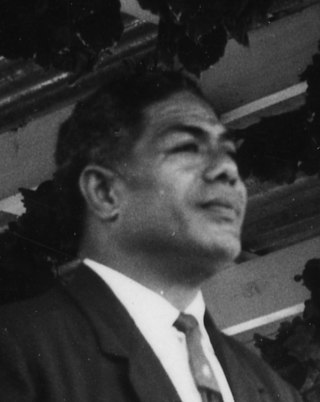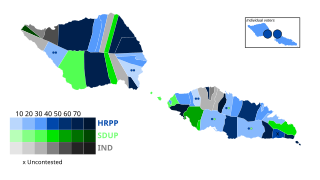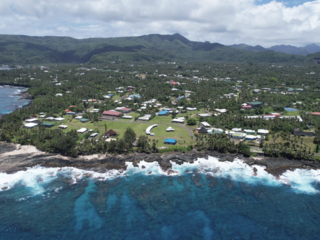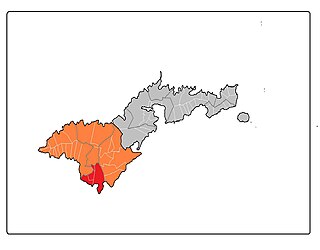Related Research Articles

Samoa, officially the Independent State of Samoa and known until 1997 as Western Samoa, is an island country in Polynesia, consisting of two main islands ; two smaller, inhabited islands ; and several smaller, uninhabited islands, including the Aleipata Islands. Samoa is located 64 km west of American Samoa, 889 km northeast of Tonga, 1,152 km northeast of Fiji, 483 km east of Wallis and Futuna, 1,151 km southeast of Tuvalu, 519 km south of Tokelau, 4,190 km southwest of Hawaii, and 610 km northwest of Niue. The capital and largest city is Apia. The Lapita people discovered and settled the Samoan Islands around 3,500 years ago. They developed a Samoan language and Samoan cultural identity.

The Samoan Islands were first settled some 3,500 years ago as part of the Austronesian expansion. Both Samoa's early history and its more recent history are strongly connected to the histories of Tonga and Fiji, nearby islands with which Samoa has long had genealogical links as well as shared cultural traditions.

Politics of Samoa takes place in a framework of a parliamentary representative democratic state whereby the Prime Minister of Samoa is the head of government. Existing alongside the country's Western-styled political system is the faʻamatai chiefly system of socio-political governance and organisation, central to understanding Samoa's political system.

Malietoa Tanumafili II was a Samoan paramount chief who was O le Ao o le Malo of Samoa from its independence in 1962 until his death in 2007. He was appointed to the high title of Malietoa in 1940.

AfiogaFiamē Naomi Mataʻafa is a Samoan politician and High Chief (matai) who has served as the seventh Prime Minister of Samoa and leader of the Faʻatuatua i le Atua Samoa ua Tasi (FAST) party since 2021.

Tui Ātua Tupua Tamasese Tupuola Tufuga Efi is a Samoan political leader and paramount chief, and heads one of Samoa’s two royal families - Sā Tupua - through the family’s maximal lineage title, Tupua Tamasese.
Leafa Vitale was a Minister of Works and Minister of Women's Affairs in Samoa, who along with Toi Aukuso, former Minister of Post and Telecommunications, plotted the assassination of Samoan Minister of Public Works Luagalau Levaula Kamu in 1999.
The Christian Party was a small political party in Samoa. The party, also known as the Samoan Christian Party was led by Tuala Falenaoti Tiresa Malietoa. The party was dominated by women. It contested the 2006 Samoan general election but did not win any seats. It did not contest the 2011 election.

Susuga Malietoa Tanumafili I was the Malietoa in Samoa from 1898 until his death in 1939. After the death of his father, Malietoa Laupepa, who was recognized as king of Samoa by many Western countries, Tanumafili was immediately crowned, with Tupua Tamasese Lealofi I serving as vice-king. Tanumafili was backed by the United States and United Kingdom, however Germany supported rebel chief Mata‘afa Iosefo who was eyeing the throne. The battle between the two made up the Second Samoan Civil War and in the end caused the Tripartite Convention that split the islands. After the war, Malietoa pursued education in Fiji and then came back to Samoa, where he was appointed as an advisor.

The O le Ao o le Malo is the ceremonial head of state of Samoa. The position is described in Part III of the 1960 Samoan constitution.

General elections were held in Samoa on 31 March 2006 to determine the composition of the 14th Parliament. The main contesting parties were that of incumbent Prime Minister Tuilaʻepa Saʻilele Malielegaoi, of the Human Rights Protection Party (HRPP); and the Samoan Democratic United Party (SDUP). In addition, three other parties, the Christian Party (SCP), the Samoa Party (SP), and the Samoa Progressive Party (SPP), competed in the election. The result was a landslide victory for the HRPP, which won 33 of the 49 seats. The newly founded SDUP secured ten seats, and the remaining six were won by independents. After the election, three independents joined the HRPP, increasing the party's seat count to 36.

Faʻamatai is the indigenous political ('chiefly') system of Samoa, central to the organization of Samoan society. It is the traditional indigenous form of governance in both Samoas, comprising American Samoa and the Independent State of Samoa. The term comprises the prefix faʻa and the word matai.
Iosefa Enari was a New Zealand opera singer who was born in Samoa. The Iosefa Enari Memorial Award, presented annually by Creative New Zealand, recognises Enari's pioneering contribution to Pacific Islands opera. Enari was the Artistic Director of Classical Polynesia, the first New Zealand opera combining traditional Samoan words and music with classical opera.

Vailoatai is a village in southwestern Tutuila, the main island of American Samoa. It is located on the eastern end of Leone Bay. The village is known for its beautiful malae, nested along the island's rugged southern coast and lined by the fale tali mālō of its village chiefs.

General elections were held in Western Samoa on 1 November 1935.

Tuālā-tai County is one of the five counties that make up the Western District of American Samoa.

Faʻatuatua i le Atua Samoa ua Tasi is a political party in Samoa. It was founded by MP La'auli Leuatea Polataivao and is currently led by Prime Minister Fiamē Naomi Mataʻafa.

AfiogaTuala Tevaga Iosefo Ponifasio is a Samoan politician, lawyer and Cabinet Minister who has served as the deputy prime minister of Samoa since 2021. Elected to parliament as an independent "kingmaker" in the 2021 election, he later joined the Faʻatuatua i le Atua Samoa ua Tasi party.
Tuala Tagaloa Sale Kerslake is a Samoan judge, politician and former Cabinet Minister. From 2004 — 2016 he was President of the Land and Titles Court of Samoa. He is a member of the Human Rights Protection Party.
Adrienne Lili'i is a former New Zealand rugby union player. She debuted for the New Zealand women's national side, the Black Ferns, on 16 October 1999 against Canada at Palmerston North. She was selected for the 2002 Women's Rugby World Cup squad and started in four of their five games.
References
- ↑ "Tuala Falenaoti Tiresa MALIETOA". New Zealand Herald. Retrieved 26 June 2021.
- ↑ "First woman to lead Samoa political party outlines policy". RNZ. 16 January 2006. Retrieved 26 June 2021.
- ↑ "Samoan women come out of the kitchen, into politics". New Zealand Herald. 28 March 2006. Retrieved 26 June 2021.